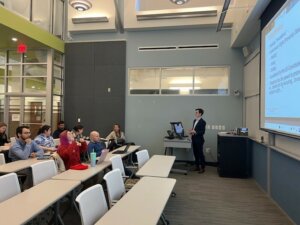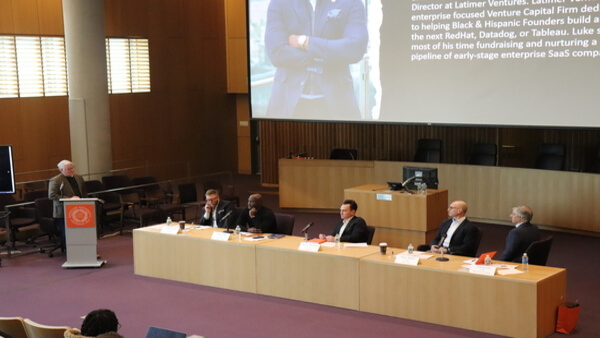News From the Innovation Law Center Venture to Victory… a Success On February 13th, the Syracuse University College of Law hosted a Symposium featuring five alumni panelists: James Kelly, Luke Cooper, Kevin Whittaker, Peter Alfano, and Lon Levin (as pictured from left to right above). The panelists considered issues startups and maturing companies face when considering venture capital (VC) investment and private equity (PE) acquisition. The panelists provided insight on issues that included what the VC and PE industries look for in a company, tackling the challenges of founding a startup company, good practices for in-house counsel, and navigating big law VC and PE practices. The panelists engaged in a mock negotiation simulating a CEO of a hypothetical start-up company, a VC investor in the company, in-house counsel, a private equity firm, and counsel for the private equity firm. Each panelist’s role illustrated the myriad of issues companies face when bringing on VC or PE. The panelists also provided personal anecdotes on post-graduation struggles and challenges in finding their way toward their successful careers in innovation. For takeaway advice, many of the panelists noted the importance of creating a reliable network, and developing and dedicating oneself to a culture that would reflect the values and beliefs they wanted to embody and portray as a professional. Read more about the Symposium here. Continuing Challenges to OpenAI Last month Syracuse law professor Shubha Ghosh wrote about the lawsuit between the New York Times and OpenAI. This month he discusses another dispute between two authors and OpenAI. Read his article here. Professor Ghosh quoted on Need for Legal Recourse on AI Fakes Earlier this year, fake explicit imagery of American singer-songwriter, Taylor Swift, was released on social media site ‘X’ (formerly known as ‘Twitter’) using artificial intelligence (AI). This is just one example of the growing problems with AI applications. In an article addressing the dearth of legal options available, Professor Ghosh was quoted on the potential legal recourse Swift and others affected by AI created fake explicit imagery, could pursue – including a defamation suit against X for sharing it. Professional Development Workshop: ‘Introduction to Intellectual Property’ 
On January 31st, the BioInspired Graduate & Postdoctoral Professional Development Program hosted a workshop centered on intellectual property protection and the innovation process. It was presented by ILC Executive Director Brian Gerling and 3L law student and research associate, Kalen Sullivan. The NYS STLC at the ILC is available to provide similar workshops on IP issues relating to tech commercialization. For more information, contact the nysstlc@syr.edu. Innovation Law Center
The ILC is the designated NYS Science & Technology Law Center. It is funded by the Empire State Development Corp. to provide information and research on legal issues relevant to the technology commercialization process. Research is available to early-stage companies, research centers, economic development agencies, technology transfer offices and researchers throughout New York State. Research on the intellectual property, competitive and market landscapes relevant to a new technology are completed by law and business students under supervision of faculty.
If you are interested in having the ILC complete research, please submit a request here. | 


